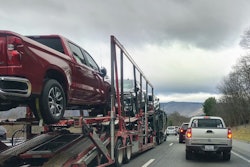Trucking news and briefs for Monday, Feb. 19, 2024:
Narcotics smuggling ring broken up in California
The U.S. Attorney’s Office for the Central District of California announced charges against 17 individuals who are accused of using semi trucks to smuggle narcotics into the United States from Mexico. This is the second such smuggling scheme busted this year in the same district.
According to a press release from the U.S. Attorney’s Office, the trafficking organization used tractor-trailers to move fire extinguishers filled with drugs across the United States-Mexico border. During the two-year investigation, called Operation “Smoke Jumpers,” authorities made 13 seizures that yielded approximately 680,992 fentanyl pills, 3 kilograms of fentanyl powder, 17 kilograms of heroin, and 10,418 pills containing methamphetamine.
Nine defendants were arrested during law enforcement operations from Feb. 8-12. One defendant was already in state custody. Seven additional defendants are fugitives believed to be in Mexico.
“These defendants used a sophisticated network to smuggle immense amounts of fentanyl into our country,” said U.S. Attorney Martin Estrada. “We know that every fentanyl pill can kill, but these defendants did not care about the widespread destruction they were causing. Our office will continue to work intelligently and aggressively to bring international drug-trafficking organizations to justice.”

[Related: Inspectors to key in on tractor protection systems, drug and alcohol violations with Roadcheck 2024]
The 15-count indictment unsealed on Feb. 8 charged various defendants with drug trafficking counts and a money laundering conspiracy. The nine defendants arrested are:
- Oscar Ahumada Leyva, 43, of Mexico
- Miguel Antonio Rabago Valenzuela, 42, of Mexico
- Gustavo Rivero Rodriguez, 39, of Mexico
- Carlos Espinoza, 38, of Alhambra, California
- Erick Roque Angeles, 39, of Fontana, California
- David Sanchez Balderas, 26, of Denver
- Fernando Salgado, 36, of Riverside, California
- Rocio Guadalupe Acevedo Tonche, 32, of Ontario, California
- Efren Quibrera Espinoza, 29, of Cudahy, California
According to a warrant to search a phone seized when Carlos Espinoza was arrested, the investigation focused on Carin Trucking, a San Diego-based outfit owned by Leyva that operated at least six trucks that regularly entered the United States from Mexico to deliver suspected narcotics to the Los Angeles area, including counterfeit pills containing fentanyl concealed in fire extinguishers. Initially, those extinguishers were disguised as scrap metal -- later, defendants moved extinguishers that appeared legitimate, according to the search warrant filed Feb. 12.
Drivers in the operation, according to the search warrant, "would drive into the United States from Mexico and cross the border usually carrying a load of scrap metal, and concealed inside will be a scrap metal fire extinguisher containing drugs. The truck driver would then make his way up to Los Angeles, to meet a courier, who would pick up the drug-packed fire extinguishers for further distribution.”
The indictment alleges two narcotics conspiracies and 12 drug possession offenses, each of which carry a mandatory minimum sentence of 10 years in federal prison and a potential life sentence. Count 15, which alleges a money laundering conspiracy, carries a statutory maximum penalty of 20 years in prison.
[Related: Truck drivers among 10 arrested, 19 charged in international drug smuggling case]
New electric truck charging service launching in California
Renewable Properties, a developer and investor in small-scale utility and community solar projects, has launched a new electric vehicle (EV) fleet charging service for medium- and heavy-duty truck and bus fleets.
The service will leverage the company’s extensive community solar development, land acquisition, and electrical infrastructure expertise to provide a turnkey charging solution for companies transitioning their truck fleets from fossil fuels to electric power.
Renewable Properties has selected global engineering and construction company Black & Veatch to design the first EV charging station on land that Renewable Properties recently acquired in Vacaville, California, a Bay Area transportation and distribution hub for major retail brands. This first station will act as a model for deploying more private charging depots for medium and heavy-duty electric truck and bus fleets on the West Coast, the company said.
[Related: Electric trucks don't stand a chance, even in drayage, without more accessible power infrastructure]
Charging at Renewable Properties’ depots will be offered via a charging-as-a-service agreement similar to a power purchase agreement (PPA), with no upfront costs to fleet owners and operators. Renewable Properties will site, build, own, operate and maintain the gated depots, with customers paying only for the kilowatt-hours used to charge their EVs.
The charging depots will feature reserved electrical capacity, secure yards, vehicle storage and EV chargers that will be compatible with most EV truck brands.
[Related: Tesla's Semi blows past diesels uphill, but do owner-ops care?]
Hawaii gets CDL testing exemption for lack of infrastructure
The Federal Motor Carrier Safety Administration has granted a waiver to the state of Hawaii allowing the state to forgo specific portions of the CDL skills test for applicants who take the skills test on the islands of Lanai and Molokai and issue these drivers a restricted CDL.
The agency granted the exemption because the islands of Lanai and Molokai do not have the highway infrastructure to support a demonstration of certain on-road safe driving skills required by the CDL skills test, FMCSA said.
The waiver is effective Feb. 20, 2024, through Feb. 20, 2026.
In requesting the exemption, Hawaii asked for a waiver from the requirements to test for the ability to signal appropriately when changing direction in traffic; and the ability to choose a safe gap for changing lanes, passing other vehicles, and crossing or entering traffic. The state said the islands of Lanai and Molokai do not have at least two miles of a straight section of urban business street and at least two miles of an expressway or highway section with multiple lanes going in each direction to allow the ability to legally change lanes.
The state proposed to establish a new CDL restriction “R,” limiting the CDL’s validity to the islands of Lanai and Molokai only, and which would be applied to these drivers who pass a CDL skills test without demonstrating those two skills. Hawaii added that if it stopped offering CDL road tests on both islands, it would be a significant barrier for CDL applicants to meet all of the required skills test standards and obtain a CDL. There would also be a negative economic impact on the communities’ livelihood, the state added.
[Related: Prospective CDL holders in remote Alaska get entry-level-training relief]









